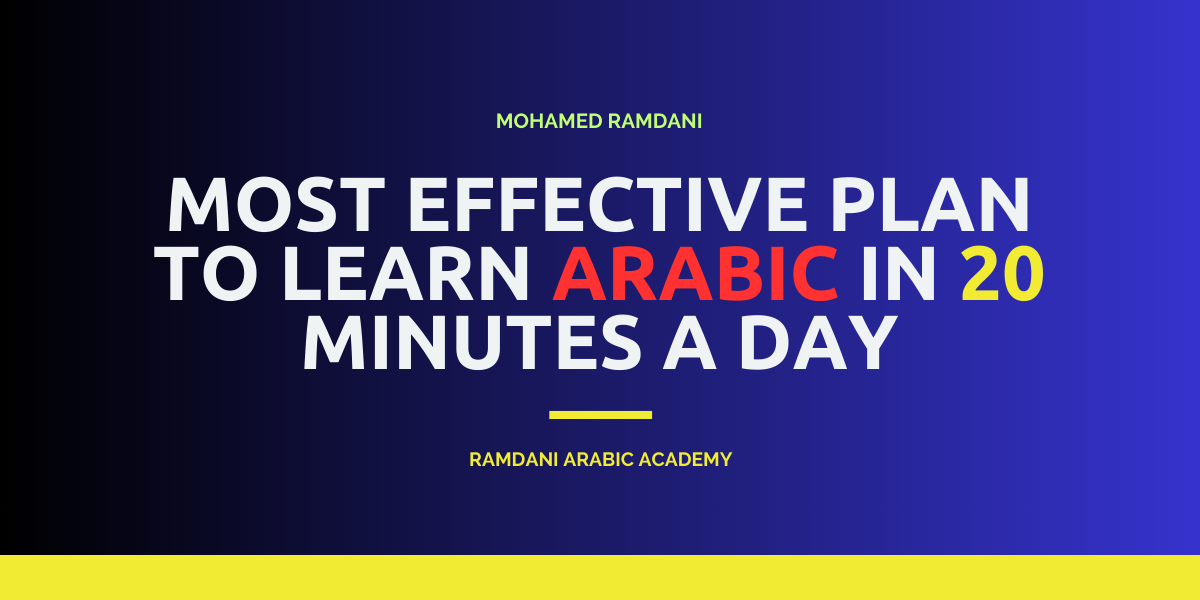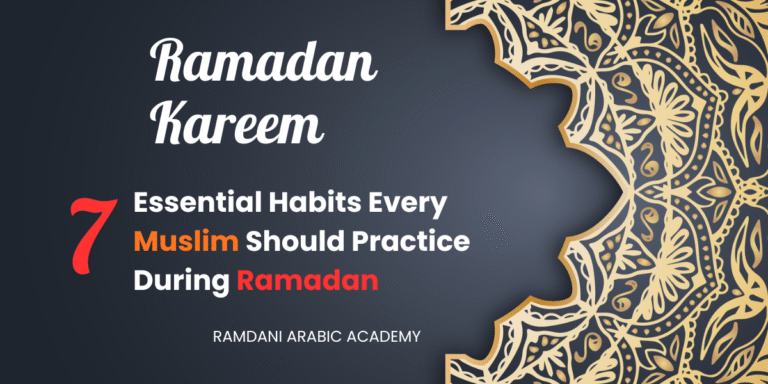Most effective Plan to Learn Arabic in 20 Minutes a Day
Learning Arabic can feel overwhelming. The language has a new alphabet, new sounds, and a grammar system that works differently from English or other European languages. Many learners think they need hours every day to make progress. This belief often stops them from even starting. The truth is you don’t need to spend your entire day studying. You just need a plan and consistency.
If you have only 20 minutes a day, you can still make real progress. The key is to use those minutes wisely. Most people waste time searching for what to learn next or repeating random words they found online. This is why many give up after a few weeks. A clear plan solves this problem. It tells you what to focus on, what to skip, and how to measure your growth.
I created this guide to show you how to use a short daily routine to build real Arabic skills. It does not matter if you are a complete beginner or if you already know a few words. You can adapt this plan to your level. The goal is to make Arabic part of your day without stress or pressure.
Why only 20 minutes? Because most people are busy. You might have work, school, or family to take care of. Long study sessions can feel like a burden, and when you miss one, you feel guilty and lose motivation. But almost everyone can find 20 minutes somewhere in their day—during a coffee break, early in the morning, or before bed. Short, focused study is more effective than long, distracted study.
Another reason for short sessions is memory. Research shows that the brain remembers better when it reviews small amounts regularly rather than cramming once a week. Daily repetition is what moves Arabic words and rules from short-term memory to long-term memory. This is how you start thinking in the language instead of translating in your head.
This guide is not just about vocabulary lists or grammar drills. It is about creating a habit. When you do something daily, it becomes automatic. You no longer debate with yourself whether you should study. You just do it, like brushing your teeth. Once Arabic becomes part of your daily routine, you stop worrying about motivation because the habit takes over.
I will break this plan into steps that you can follow immediately. Each step will focus on a different skill: reading, listening, speaking, and writing. You will see how to divide your 20 minutes to cover all four skills over the course of a week. You will also find tips to stay motivated and track your progress.
This is the same method I used with many of my students at Ramdani Arabic Academy. It works because it is simple, realistic, and easy to follow. If you stick with it, you will notice your Arabic improving after just a few weeks.

Part 1 – The 20-Minute Daily Plan
Your 20 minutes should have structure. You don’t want to waste time deciding what to do. Break it into small blocks so you can cover the key skills that matter most.
Minutes 1–5 – Review and Warm-up
Start with a quick review.
- Go over yesterday’s words or sentences
- Read them out loud
- Cover the meaning and try to recall it before checking
This step reminds your brain of what you learned before. It takes just five minutes but keeps you from forgetting.
Minutes 6–10 – Learn Something New
Choose one small topic per day.
Examples:
- 5 new words related to food, travel, or work
- One short grammar rule like plurals or simple verb forms
- A short dialogue from a course or article
Focus on understanding and saying the new material out loud. Don’t take on too much. Small steps add up if you repeat them every day.
Minutes 11–15 – Listening Practice
Listen to Arabic for five minutes.
- Use short audio clips, podcasts for learners, or a dialogue from your lesson
- Play it two or three times
- Repeat what you hear and copy the sound
Listening daily helps you recognize words when you hear them in real conversations. Even a few minutes of listening builds your ear.
Minutes 16–20 – Speaking or Writing
Use the last five minutes to produce Arabic.
- Say sentences with the words you learned
- Record yourself and listen back
- Or write 2–3 simple sentences in a notebook
The goal is to use the language, not just recognize it. Speaking and writing help you remember faster.
Example for Beginners
Day 1
- Review numbers 1–10
- Learn numbers 11–15
- Listen to an audio clip counting from 1 to 20
- Say each number out loud and write them once
Day 2
- Review numbers 11–15
- Learn 5 greetings
- Listen to a greeting dialogue
- Record yourself saying “Hello, how are you?” in Arabic
This structure keeps your learning balanced. You are not just memorizing words—you are training all four skills.

Part 2 – Staying Consistent and Motivated
A daily plan only works if you follow it. The biggest challenge is not the language itself but staying consistent. Here are ways to keep going.
Set a Clear Goal
You need a reason to study.
- Do you want to travel to an Arab country?
- Do you want to speak with friends or family?
- Do you need Arabic for work or study?
Write this goal down. Look at it before each session. It reminds you why you started.
Choose the Same Time Every Day
Pick a time that fits your schedule.
- Early morning before work
- During lunch break
- Before sleeping
A fixed time makes study a habit. You stop debating when to do it.
Track Your Progress
Use a simple notebook or app.
- Write the date
- List what you studied
- Mark each day you complete
Seeing your streak grow gives you a sense of progress and keeps you motivated.
Start Small, Then Build
At first, focus only on showing up every day. If you can do 20 minutes for a week, you have built the habit. After that, you can add a little more time on weekends or when you feel motivated.
Don’t Fear Bad Days
Some days you will feel tired. That is normal.
- If you can’t do 20 minutes, do 5 minutes
- Just review yesterday’s lesson
- Don’t break the chain completely
Even a short review keeps the habit alive.
Reward Yourself
Celebrate small wins.
- After finishing a week of study, watch a short Arabic video you enjoy
- Share your progress with friends or online
Rewards make learning feel good and encourage you to continue.
Avoid Overload
Don’t try to learn everything at once. Focus on one small topic per day. This keeps you from feeling overwhelmed.
Example of Progress Tracking
Week 1
- Learned 25 new words
- Practiced greetings and introductions
- Listened to 5 short dialogues
By writing this down, you can see exactly what you achieved in a short time.

Part 3 – Adapting the Plan for Your Level
Not all learners need the same focus. A beginner should spend more time on the basics. An advanced learner should focus on real communication. Here’s how to adjust the plan to fit where you are.
For Beginners
Main goal: build a base of words and simple sentences.
- 5 minutes review: yesterday’s words and sentences
- 5 minutes learn: 3-5 new words or one basic grammar rule
- 5 minutes listening: slow dialogues with transcripts
- 5 minutes speaking: say simple sentences, copy the audio
Example Week for Beginners
- Day 1: numbers 1-10, practice counting
- Day 2: greetings, practice short dialogues
- Day 3: family words, say “my father, my mother” etc.
- Day 4: days of the week, say “Today is Monday”
- Day 5: review all words, listen to a simple story
- Day 6: practice speaking using all words from the week
- Day 7: light review, rest or watch an easy Arabic video
This plan builds a strong foundation fast without overloading.
For Intermediate Learners
Main goal: improve understanding and start thinking in Arabic.
- 5 minutes review: yesterday’s words plus one short sentence
- 5 minutes learn: phrases from real conversations or short articles
- 5 minutes listening: native speed audio, repeat key parts
- 5 minutes speaking or writing: describe your day or answer questions
Example Week for Intermediate Learners
- Day 1: learn phrases for ordering food
- Day 2: learn phrases for directions, practice asking
- Day 3: listen to a news clip, pick out 3 new words
- Day 4: write 3 sentences using new words
- Day 5: review everything, record yourself speaking
- Day 6: watch a short Arabic video with subtitles
- Day 7: summarize what you learned in writing
This helps you move from memorizing words to using them in real life.
For Advanced Learners
Main goal: fluency and deep understanding.
- 5 minutes review: key phrases or grammar patterns
- 5 minutes learn: read a short news article or tweet
- 5 minutes listening: native podcast or video without subtitles
- 5 minutes speaking or writing: give your opinion or write a short response
Example Week for Advanced Learners
- Day 1: read a news headline, summarize it in Arabic
- Day 2: listen to a native speaker and note 3 useful expressions
- Day 3: record a 30-second opinion about a topic
- Day 4: write 3 sentences using complex grammar
- Day 5: debate or discuss with a language partner
- Day 6: watch a short film, note new vocabulary
- Day 7: review everything, create your own flashcards
At this level, the goal is to sound natural and confident. Focus on topics you care about so you stay engaged.

Part 4 – Tools and Resources for Your 20-Minute Plan
Having the right tools makes your study faster and easier. You don’t want to waste time searching for material every day. Prepare your tools once and use them every day.
Flashcards for Vocabulary
Flashcards help you review quickly.
- Use apps like Anki or Quizlet
- Add your own words after each session
- Review them daily in the first 5 minutes
Digital flashcards save time because they show you the hard words more often and skip the easy ones.
Audio for Listening Practice
Listening every day is important.
- Use short podcasts for learners like ArabicPod101
- Watch short videos on YouTube with subtitles
- Replay the same clip until you can follow it
If you like music, pick a slow Arabic song and learn the lyrics line by line.
Short Texts for Reading
Reading builds vocabulary naturally.
- Use children’s books or graded readers for beginners
- Read short news articles for higher levels
- Write down 3 new words each time you read
Reading just a few sentences daily keeps you exposed to real Arabic.
Voice Recording for Speaking
Record yourself on your phone.
- Compare your pronunciation to the native audio
- Try to say full sentences
- Listen to your own recording and fix mistakes
This builds confidence and lets you hear your progress over time.
Writing Tools
Use a simple notebook or Google Docs.
- Write 2–3 sentences about your day
- Focus on using the words you learned
- Keep it short but consistent
Over time, you will see your sentences grow longer and more natural.
Community and Interaction
Find people to practice with.
- Join language exchange apps like HelloTalk or Tandem
- Chat with other learners in Facebook or WhatsApp groups
- If possible, find a tutor once a week to practice speaking
Talking to real people makes the language come alive and keeps you motivated.
Organizing Your Study
Keep all your tools in one place.
- One folder for your notes
- One app for flashcards
- One playlist for listening
This saves time and helps you jump into your study without thinking.

Final Advice
Learning Arabic does not have to be complicated. You can make real progress in just 20 minutes a day if you stay consistent. The plan you just read works because it is simple and realistic. You review what you know, learn something new, listen to native Arabic, and use the language every single day.
Your job is to show up every day and follow the steps. Don’t wait for perfect motivation. Don’t wait for the perfect time. Start today, even if you only have five minutes. Once it becomes a habit, the results will surprise you.
Here are a few final tips
- Keep your sessions short and focused
- Track your progress to stay motivated
- Speak out loud every day, even when you are alone
- Use material that interests you so learning feels fun
- Don’t compare yourself to others, focus on your own path
Remember, language learning is not a race. It is about building skills step by step. Small, daily practice is much more powerful than long, rare study sessions.
At Ramdani Arabic Academy, we help learners from around the world follow plans like this one. Our courses, articles, and lessons are designed for busy learners who want clear guidance and results. If you are serious about learning Arabic, explore our lessons and join our community.
This article was written by Ramdani Mohamed, founder of Ramdani Arabic Academy. I have worked with many learners who thought they were too busy or too old to learn Arabic. Once they followed a simple plan like this, they saw real progress. You can do the same.
Start today. Open your notebook. Learn five words. Listen to one short audio. Say a sentence out loud. This is how you build the habit that will take you to fluency.







